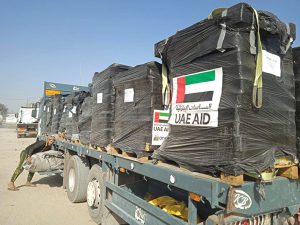ABU DHABI / WAM
The United Arab Emirates, in close partnership with American Near East Refugee Aid (Anera), has announced the successful delivery of 400 tonnes of food aid for the brotherly people of Gaza, specifically intended for the northern Gaza Strip. The delivery and distribution of life-saving food aid to feed around 120 thousand people, aligns with the UAE’s commitment to provide relief and address the humanitarian crisis in Gaza. Reem Al Hashimy, Minister of State for International Cooperation, said, “The UAE’s safe and successful delivery and distribution of food relief to the Gaza Strip, especially the Northern Gaza Strip, marks a significant scaling up in action. We remain firmly committed to our position of solidarity with the brotherly Palestinian people and alleviating suffering in the Gaza Strip. The UAE, working in parallel with international partners, is determined more than ever to intensify all efforts to ensure that aid lifelines get to those who need it the most.” Sean Carroll, President and CEO of Anera, said, “Anera and the people we serve are extremely grateful for support from the government and people of the UAE, that allows us to deliver this food to northern Gaza, where the needs are so great.”
Following the allocation of US$15 million under the Amalthea Fund to support aid flows in Gaza, the UAE continues to collaborate with international partners and organisations to effectively deliver food and relief through land, air and sea, to strengthen the humanitarian response and meet the needs of the people in the Strip.
To date, the UAE has delivered more than 31,000 tonnes of urgent humanitarian supplies, including food, relief and medical items, dispatched through 256 flights, 46 airdrops, 1,231 trucks, and six ships. Furthermore, the UAE has initiated a number of other sustainable relief projects to supply food and water to the people of Gaza. These efforts include establishing five automatic bakeries to meet the needs of 72,000 people; supplying flour to eight existing bakeries to meet the needs of 17,140 people; and setting up six desalination plants (operating with a combined capacity of 1.2 million gallons of water) that benefit up to 600,000 people per day.
 The Gulf Time Newspaper One of the finest business newspapers in the UAE brought to you by our professional writers and editors.
The Gulf Time Newspaper One of the finest business newspapers in the UAE brought to you by our professional writers and editors.
